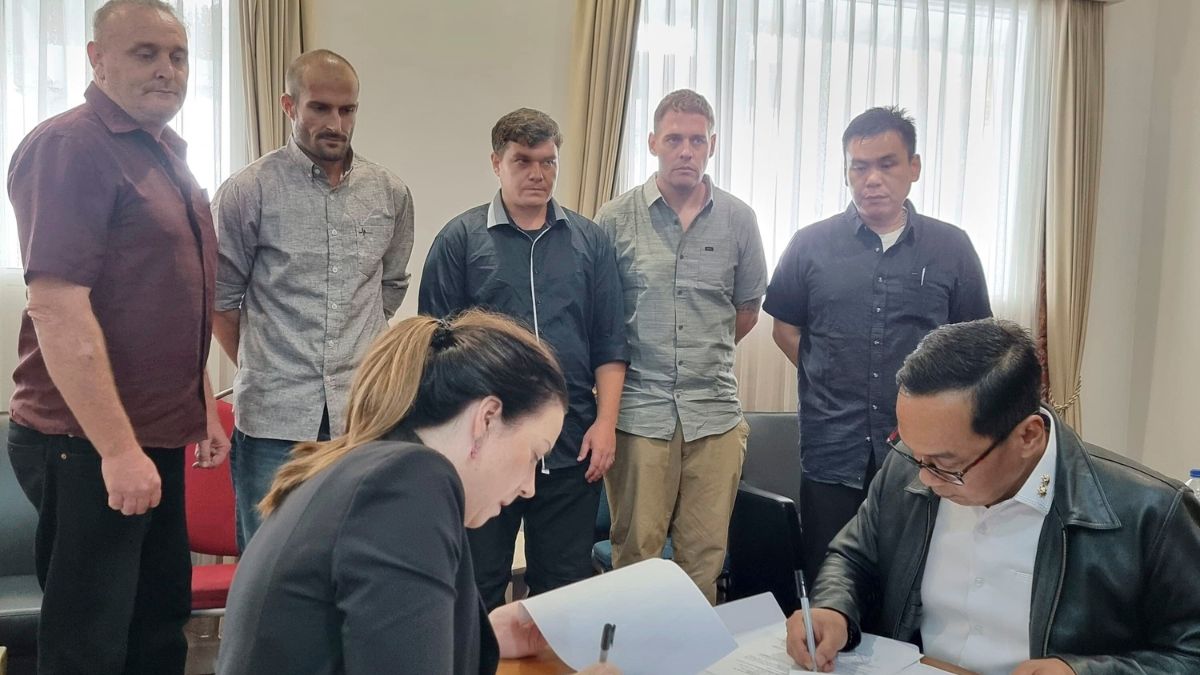Five Australians of the ‘Bali Nine’ drug gang have returned home, after spending roughly 20 years in Indonesian prisons. This comes after a deal was reached between the two governments, Australian Prime Minister Anthony Albanese said on Sunday (December 15).
“The Australian Government can confirm that Australian citizens, Matthew Norman, Scott Rush, Martin Stephens, Si Yi Chen, and Michael Czugaj have returned to Australia,” he said in a statement.
“These Australians served more than 19 years in prison in Indonesia. It was time for them to come home,” the Australian PM added.
Let’s take a closer look.
What’s the case?
In 2005, nine Australians were arrested for trying to smuggle more than 8 kg of heroin out of Indonesia’s Bali.
According to the Australian Broadcasting Corporation (ABC), the drug’s estimated street value was about $4 million at the time.
The arrest came after a tip-off from Australian police.
These young Australians were tried and sentenced in Indonesia amid heightened media attention, coming to be known as the Bali Nine.
Meet ‘Bali Nine’
One of the drug gang’s ringleaders, Andrew Chan, was just 22 when he was arrested at Bali’s Denpasar International Airport after boarding a plane to Sydney.
As per The Guardian, he became a committed Christian in prison in Indonesia and married his fiancee, Febyanti Herewila.
Myuran Sukumaran, the other alleged ringleader, was sentenced to death in 2006. His various appeals to have the sentence commuted were rejected. In prison, he emerged as a prolific painter, even teaching other prisoners, the British newspaper noted.
The two ringleaders were executed by firing squad in 2015, triggering a diplomatic row between neighbours Indonesia and Australia. The then Australian Prime Minister Tony Abbott had called it “a dark moment in the relationship.”
Australia even went on to briefly recall its ambassador to Indonesia after the executions.
Renae Lawrence, the only woman in the group, was apprehended at Denpasar airport with 2.7kg of heroin strapped to her body. She got a life term which was reduced to 20 years eventually. She was let out early on account of good behaviour.
Lawrence ultimately walked out of prison in 2018 and returned to Australia after 13 years in jail. In 2020, she publicly called on reducing the sentences of the remaining Bali Nine members, reported The Guardian.
Tan Duc Than Nguyen, who was arrested at a hotel on the island of Kuta, died of kidney cancer in 2018 at the age of 34.
Matthew Norman, who was just 18 at the time of his arrest from a Kuta hotel, was given a life sentence. This term was first reduced to 20 years and then increased to execution, as per The Guardian report.
It was eventually changed to life without chance of parole. Norman lived in Bali’s Kerobokan prison, where he gave English lessons and ran computer classes for fellow inmates.
Si-Yi Chen, then 20, was arrested at a hotel at Kuta Beach. He was serving life in prison before his return to Australia this Sunday.
Like Norman, he was at Kerobokan prison, where he taught other prisoners to make jewellery, reported The Guardian.
Michael Czugaj was found at Denpasar airport with 1.75kg of heroin strapped to his body. He initially got a life term with no chance of release. This was commuted to 20 years but his life sentence was subsequently reimposed.
Martin Stephens, the oldest of the drug gang, was apprehended at the Bali airport with 3.3kg of heroin strapped to his body. He was sentenced to life in prison without chance of parole.
Stephens, who has a daughter from his marriage, was in prison in Java, as per The Guardian report.
Scott Rush, then 19, was arrested at Denpasar airport with 1.3kg of heroin strapped to his body, the British newspaper noted. He was eventually handed a life sentence after an appeal.
What happens now?
The five released men returned to Australia on Sunday as free citizens and would not serve their life sentences in Australian prisons, as per an Associated Press (AP) report.
The Australian PM thanked Indonesian President Prabowo Subiant for the men’s release.
“Australia respects Indonesia’s sovereignty and legal processes and we appreciate Indonesia’s compassionate consideration of this matter,” Albanese said.
He said the men’s return reflected “the strong bilateral relationship and mutual respect” between the two countries.
The Australian PM said there was no exchange of prisoners or other diplomatic quid pro quo for the men’s release.
The terms of their transfer are still being discussed between Australia and Indonesia, reported Sky News.
Jakarta had shared a draft proposal for the return of these five men earlier this month. It included banning them from returning to Indonesia, as well as Australia respecting the order of the Indonesian court.
The draft also said it would respect Australia’s decision about the men, including if they are pardoned after returning to their home country.
As per AP, Indonesia’s senior law minister, Yusril Ihza Mahendra, said the men were transferred to Australia as “prisoners” but “once repatriated”, they were the responsibility of the Australian government. They were not pardoned by the Indonesian president.
Australian broadcaster ABC reported the men were free to live in Australia.
PM Albanese said they will “have the opportunity to continue their personal rehabilitation and reintegration here in Australia.”
Their families told the local media in a statement that the five were “relieved and happy to be back in Australia."
“They look forward, in time, to reintegrating back into and contributing to society,” the statement read.
With inputs from agencies


)

)
)
)
)
)
)
)
)



